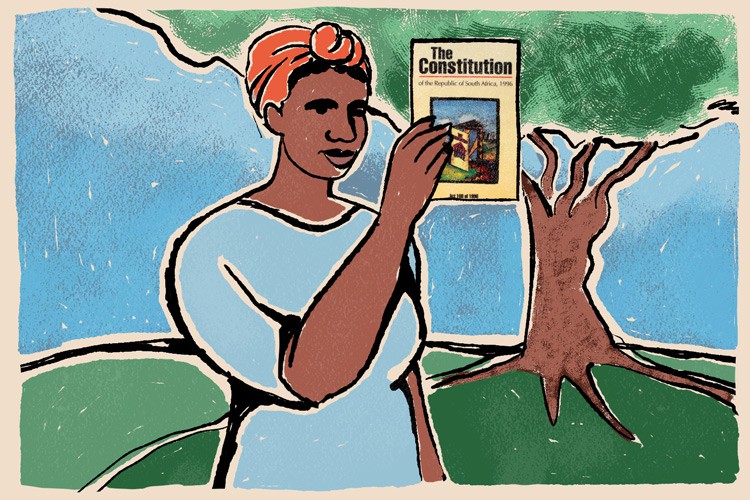Medicine stockouts: contraceptives are the worst hit
Survey shows that many women cannot access the contraceptive injection
The state has an obligation to meet the needs of women who want contraception, say the authors of a report which found that the contraceptive injection is often not available at state health facilities. Graphic: Lisa Nelson
- Injectable contraception has been the hardest hit by stockouts in the public health system over the past months, a survey has found.
- The survey by the Stop Stockouts Project questioned more than 15,000 patients in seven provinces.
- The researchers found that 7% of patients had left the clinic or hospital without the medicine they needed.
- Of these, 40% said they had wanted contraceptives.
A survey of stockouts over the last few years has found that female contraceptives, especially the injection, were the worst affected.
A survey by the Stop Stockouts Project of 15,750 patients in 402 health facilities between April and June this year found that the contraceptive injection was worst affected by stock-outs. The survey covered seven provinces, excluding the Western Cape and Northern Province.
The project was established in 2013 by a consortium of civil society organisations, including Doctors without Borders, Rural Doctors Association of South Africa, Rural Health Advocacy Project, SECTION27 and the Treatment Action Campaign.
It monitors and reports on the availability of medicine at primary health facilities to enable speedy resolution of supply shortages.
The most recent study was done with the assistance of Ritshidze, a community-led clinic monitoring system.
Of the patients surveyed, almost 7% said they had left the clinic without the medicines they needed. The report said this had improved since the first surveys in 2013.
Of those who said they had not got what they needed, 40% said it was contraceptives. And more than 76% of those said it was the injectable contraceptive.
“While it is reassuring to see that the 95% of those requesting contraception (including men asking for condoms) were able to get what they wanted, it was concerning that contraception, specifically the injectable contraception, stood out at the most reported medicine shortage across the country - more than twice that of HIV medicines and vaccines,” the report noted.
“The survey also showed that 10% of stockouts were pregnancy tests.”
Responses from the clinic managers indicated that if the desired contraception was not available, they would recommend an alternative which was available.
“While this is a reasonable response from healthcare workers trying to support patients, switching contraceptives can have a detrimental impact on women’s health and it is not a long term solution to stockouts,” the report said.
Dr Mala Panday, an obstetrician and gynaecologist at King Dinuzulu Hospital in Durban, cautioned that switching from one contraceptive to another increased the risk of pregnancy. Further increases in the rates of unintended pregnancy increased abortion rates and worsened maternal morbidity.
“Women should be able to access their preferred contraceptives at all times,” the report noted.
“Not being able to access one’s contraception of choice … implied that one must choose from accepting an option that is not preferred, going without or accessing it elsewhere at additional cost.
“There is also a reported lack of clinical guidance on how to manage hormonal contraceptive stockouts and this puts staff and patients in a difficult position.
“The varied time frame for expected resolution of shortages suggests that the system is not responsive to the needs of those it is serving and there is poor planning. Contraceptive stockouts have been ongoing since at least 2017,” the report said.
“South Africa has progressive laws and policies, including the right to access contraceptives and abortions from public health care facilities. The state has an obligation to ensure that they are able to meet women’s needs.” The report said the most vulnerable women were affected.
The authors of the report urged the government to find ways to resolve contraceptive stockouts swiftly and to look at providing access to long-term contraceptives, such as IUDs.
Support independent journalism
Donate using Payfast

Don't miss out on the latest news
We respect your privacy, and promise we won't spam you.
Next: How bad is health care in Zimbabwe?
Previous: This is not a broken bus. This is a classroom in an Eastern Cape school.
© 2022 GroundUp. This article is licensed under a Creative Commons Attribution-NoDerivatives 4.0 International License.
You may republish this article, so long as you credit the authors and GroundUp, and do not change the text. Please include a link back to the original article.
We put an invisible pixel in the article so that we can count traffic to republishers. All analytics tools are solely on our servers. We do not give our logs to any third party. Logs are deleted after two weeks. We do not use any IP address identifying information except to count regional traffic. We are solely interested in counting hits, not tracking users. If you republish, please do not delete the invisible pixel.

